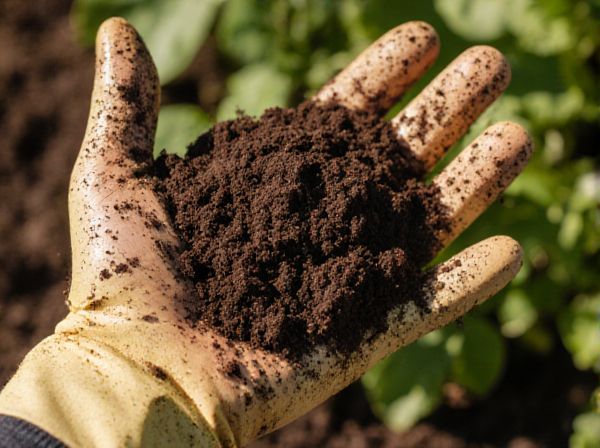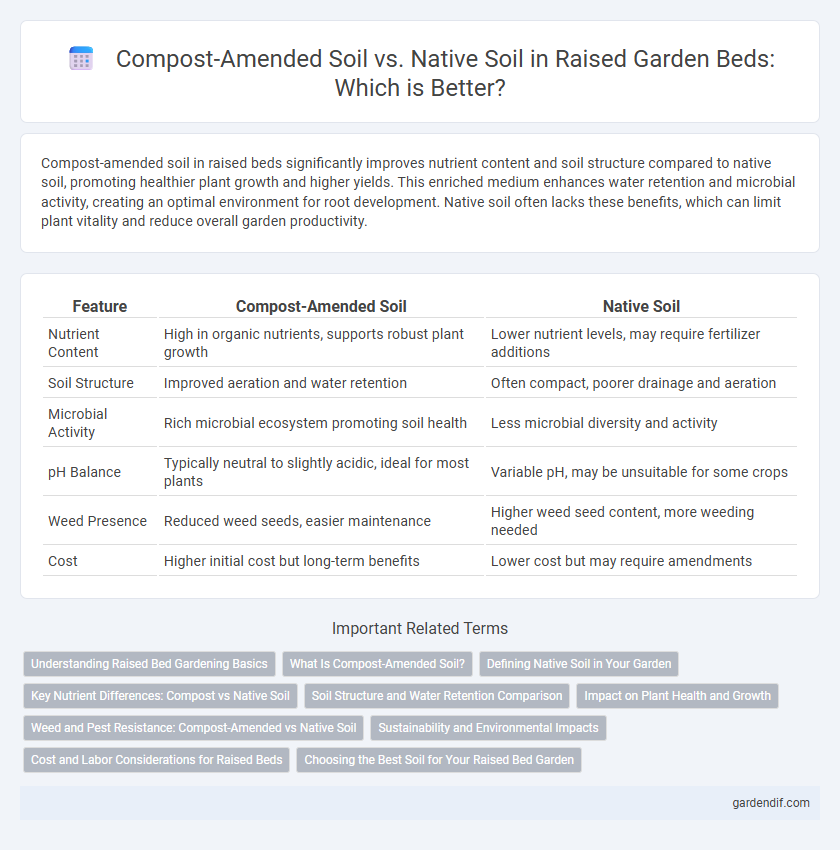
Compost-amended soil vs Native soil Illustration
Compost-amended soil in raised beds significantly improves nutrient content and soil structure compared to native soil, promoting healthier plant growth and higher yields. This enriched medium enhances water retention and microbial activity, creating an optimal environment for root development. Native soil often lacks these benefits, which can limit plant vitality and reduce overall garden productivity.
Table of Comparison
| Feature | Compost-Amended Soil | Native Soil |
|---|---|---|
| Nutrient Content | High in organic nutrients, supports robust plant growth | Lower nutrient levels, may require fertilizer additions |
| Soil Structure | Improved aeration and water retention | Often compact, poorer drainage and aeration |
| Microbial Activity | Rich microbial ecosystem promoting soil health | Less microbial diversity and activity |
| pH Balance | Typically neutral to slightly acidic, ideal for most plants | Variable pH, may be unsuitable for some crops |
| Weed Presence | Reduced weed seeds, easier maintenance | Higher weed seed content, more weeding needed |
| Cost | Higher initial cost but long-term benefits | Lower cost but may require amendments |
Understanding Raised Bed Gardening Basics
Compost-amended soil in raised beds significantly improves nutrient content, soil structure, and water retention compared to native soil, enhancing plant growth and yield. Native soil often lacks organic matter and essential nutrients, leading to poor drainage and compaction that restrict root development. Incorporating compost creates a fertile, well-draining environment essential for successful raised bed gardening.
What Is Compost-Amended Soil?
Compost-amended soil is a mixture enriched with decomposed organic matter that improves soil fertility, structure, and moisture retention compared to native soil. It provides essential nutrients and beneficial microorganisms that promote healthy plant growth in raised beds. Unlike native soil, compost-amended soil enhances aeration and drainage while increasing the soil's ability to support a diverse root system.
Defining Native Soil in Your Garden
Native soil in your garden refers to the original, undisturbed soil that exists beneath the surface without any amendments or imported materials. It contains natural organic matter, minerals, and microorganisms specific to your region's ecosystem, influencing plant health and growth potential. Understanding the characteristics of native soil, such as texture, drainage, and nutrient content, is essential for optimizing raised bed gardening and deciding when to incorporate compost-amended soil.
Key Nutrient Differences: Compost vs Native Soil
Compost-amended soil contains higher levels of essential nutrients such as nitrogen, phosphorus, and potassium compared to native soil, which often lacks these key elements necessary for robust plant growth. The organic matter in compost improves soil structure and enhances nutrient retention, facilitating better root absorption and microbial activity. Native soil typically has lower nutrient availability and poorer water retention, making compost amendment crucial for optimizing plant health in raised beds.
Soil Structure and Water Retention Comparison
Compost-amended soil significantly improves soil structure by increasing organic matter content, which enhances aggregate stability and porosity compared to native soil. This results in better water retention capabilities, allowing raised beds to maintain moisture more effectively and reduce irrigation needs. Enhanced microbial activity in compost-amended soil also promotes nutrient availability and root growth, creating a healthier growing environment.
Impact on Plant Health and Growth
Compost-amended soil enhances nutrient availability, microbial activity, and moisture retention, directly promoting robust root development and vigorous plant growth compared to native soil. Native soil often lacks organic matter and essential nutrients, leading to slower plant growth and increased susceptibility to diseases. Improved soil structure and balanced pH in compost-amended beds create an optimal environment for diverse plant health and resilience.
Weed and Pest Resistance: Compost-Amended vs Native Soil
Compost-amended soil significantly reduces weed pressure and pest infestations compared to native soil due to its enhanced microbial activity and nutrient profile. Beneficial microbes in compost compete with weed seeds and soil-borne pests, creating a natural barrier that native soil lacks. This improved biological environment supports stronger plant growth and lowers the need for chemical weed and pest control.
Sustainability and Environmental Impacts
Compost-amended soil enhances soil fertility and structure by increasing organic matter, reducing the need for synthetic fertilizers and decreasing greenhouse gas emissions compared to native soil. Incorporating compost supports sustainable gardening practices by promoting carbon sequestration and improving water retention, which minimizes irrigation requirements and soil erosion. Native soil often requires more chemical inputs and intensive management, leading to higher environmental impacts and reduced long-term soil health.
Cost and Labor Considerations for Raised Beds
Compost-amended soil for raised beds generally incurs higher initial costs due to purchasing quality compost and requires more labor for mixing and evenly distributing it throughout the bed. Native soil reduces upfront expenses but often demands extensive soil improvement practices over time, increasing overall labor investment. Choosing compost-amended soil can enhance nutrient availability and reduce maintenance, offsetting initial cost and labor with long-term productivity benefits.
Choosing the Best Soil for Your Raised Bed Garden
Compost-amended soil enriches raised beds with essential nutrients, improved aeration, and enhanced moisture retention, promoting healthier plant growth compared to native soil. Native soil often lacks organic matter and may contain compacted clay or sand, limiting root development and nutrient availability. Selecting a well-balanced mix of compost-amended soil ensures optimal fertility and drainage, vital for thriving raised bed gardens.
Compost-amended soil vs Native soil Infographic

 gardendif.com
gardendif.com